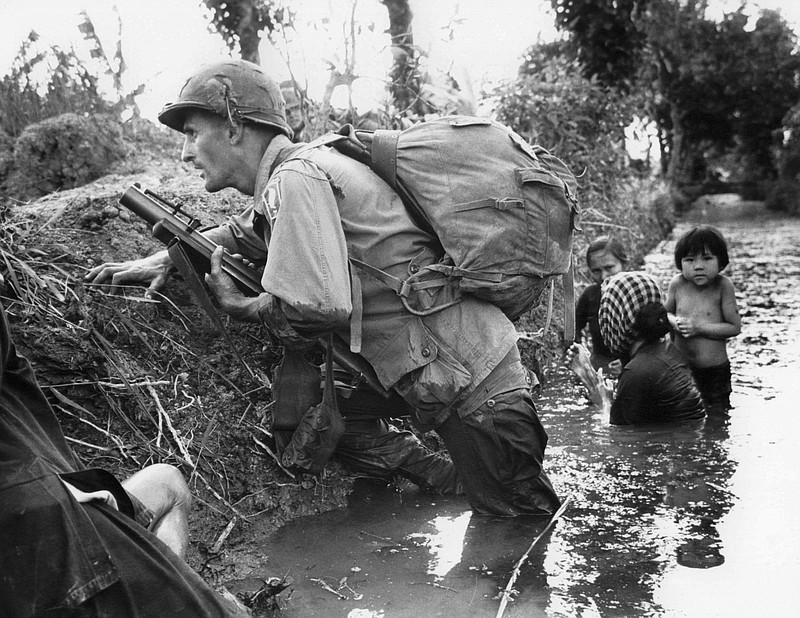A local audience witnessed a new presentation of the Vietnam War on Wednesday night, creating an opportunity to reflect upon some of their own and their generation's experiences, and to what degree that history has been taught and lessons learned.
University of Central Missouri's PBS station KMOS hosted a preview screening Wednesday of Ken Burns and Lynn Novick's new documentary "The Vietnam War" at Lincoln University's Pawley Theater.
The screening was followed by a panel discussion, moderated by LU history associate professor Thomas Gubbels and featured six Mid-Missourians who witnessed the war firsthand:
Ron Bogg, of Hartsburg: U.S. Army specialist fifth class, 1969-70;
Jacqui Chagnon, of Warrensburg: civilian aid worker during the war, and now board president of the Vermont-based War Legacies Project;
Don Hentges, of California, U.S. Army, 101st Airborne Division, 1967-69, and now president of the Jefferson City Veterans Council;
Phil Kalaf, of Jefferson City, U.S. Navy radioman, 1968-72, and now commander of the VFW Post 1003 Jefferson City;
Duard "Putt" Swope, of Warrensburg, U.S. Navy electronic warfare technician, 1968-80;
Thomas A. Ward, of Jefferson City, U.S. Navy engineman second class, 1966-70.
The preview screening featured about an hour's worth of segments from most of the documentary's 10 episodes. Segments shown featured perspectives from American and North and South Vietnamese fighters and civilians, at home and on the front lines.
Some segments provided broader, sometimes not widely-known political and military context for infamous moments of the war, like the Gulf of Tonkin incident, the Tet Offensive and photographer Eddie Adams' image of the execution of a suspected Viet Cong guerrilla.
Other segments focused on the personal experiences of people involved in the war as soldiers or as anti-war protesters, including then-21-year-old Williamsville draftee Army Spec. Michael D. Holmes, who was killed in action in April 1969.
Beyond the first panel question about initial impressions of the program, however, most of the discussion that followed was not directly about the documentary.
The discussion instead mostly became a reflection on the panelists' feelings about whether the war and their service in it were worth the sacrifices, why society today is generally uneducated about the war, whether society is even equipped to become educated about it, and whether Burns and Novick's documentary series is capable of bridging that knowledge gap.
"It seems that America has almost chosen a collective amnesia from the time period that the United States was involved in Vietnam, and because of that, they didn't want to welcome home the soldiers who did their job. They don't want to acknowledge what happened, both to our soldiers that served there and to the people (in Vietnam)," Gubbels said.
He said he teaches primarily 18- to 22-year-olds at Lincoln, "and to be honest with you, for many of them, Vietnam is nothing more than a name. They know nothing about the conflict. As far as they're concerned, it's just another war." He added some students come to him without having even learned about the Vietnam War in high school.
Kalaf said over the years, he's been interviewed by six local students from four different schools. Hentges said he's been asked multiple times to come speak to students at Jefferson City High School and Calvary Lutheran High School about the war.
"Basically, I just tell them the sacrifices that were made by all the veterans that served, and basically just try to educate them to honor and respect our veterans, regardless of the war they fought in," Hentges said. He added "freedom costs a lot and to never forget about that."
"We have to be better informed, and use our freedom of information well, and not just bury ourselves in our cellphones, playing around. And that's the hard part, for us to convince our young people to get serious, that war is serious business, and that it can destroy so much," Chagnon said. She works in Vietnam's southeast Asian neighbors of Laos and Cambodia too to help deal with the legacies there of heavy bombing and the dispersal of Agent Orange.
"I see the pain of local people there, and I come back home, and I see the pain of our veterans," she said.
An audience member asked the panel if they thought the new documentary series would help educate generations that were born after the war.
KMOS's program manager Michael O'Keefe said that's very much the intent of the filmmakers. O'Keefe explained materials have been put together to distribute to schools. "Hopefully, it's an ongoing thing; that's what they want. It's not just supposed to be a film that's out there," he said.
The consensus among all the panelists' perspectives was hope that new conversations are sparked, and people seek out more information about the war.
In addition to professional care, Bogg talked about what conversations mean for a fellow veteran and friend of his who has ongoing mental health issues.
"I think the best thing to help any of those guys, if you can find and get with him and just talk, or just listen, don't talk at all, just listen," he said.
Gubbels said he tells his upper-level history students "if they want to learn about the Vietnam War or learn about Vietnam, don't study the generals. Don't even study the political histories. Talk to soldiers who served in the conflict."
Burns and Novick's "The Vietnam War" lasts 18 hours. It will air in 10 parts, Sunday-Thursday nights for two weeks starting at 7 p.m. Sept. 17. O'Keefe added after the initial airing, it would be repeated Tuesday nights, through November.

